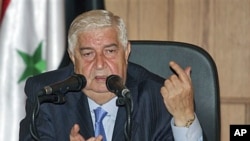The United States imposed sanctions Tuesday on Syria’s Foreign Minister and two other senior officials in connection with the Damascus government’s five-month crackdown on protestors. Foreign Minister Walid al-Moallem was targeted for being a leading defender of the violent campaign.
The Obama administration is expanding its sanctions against the Syrian government to include what the U.S. Treasury Department describes as “principal defenders of regime activities.”
A Treasury announcement said the new sanctions apply to al-Moallem, the country’s foreign minister since 2006, presidential adviser and spokeswoman Bouthaina Shaaban, and the country’s ambassador to Lebanon Ali Abdul Karim Ali.
The action freezes any U.S. assets the three may have and forbids Americans from doing business with them.
The United States now has imposed targeted sanctions on more than 30 Syrian officials, including President Bashar al-Assad, banned imports of Syrian oil products, and frozen all Syrian government assets subject to U.S. jurisdiction.
President Barak Obama formally called on Assad to step down on August 18.
State Department Spokesperson Victoria Nuland said al-Moallem and Shaaban are part of a “propaganda machine” that has tried to mislead world opinion about the Syrian situation.
“He [al-Moallem] has continued to beat this drum of international conspiracies, and has attempted to cover-up the regime’s horrific activities by making claims that terrorist or others were responsible," said Nuland. "Bouthaina Shaaban has served as the public mouthpiece for the repression of the regime.”
Nuland said the United States is concerned about possible connections between the Syrian envoy to Lebanon, Ali Abdul Karim Ali, and the harassment and apparent abduction of pro-opposition Syrian activists in that country.
“Beyond saying that we don’t think his activities were compatible with his status, that he has strong ties to Syrian intelligence, I don’t think I want to go any further than that," said Nuland. "Except to say that we have been concerned, and we’ve conveyed these concerns to the Lebanese government, about harassment of Syrians in Lebanon and the disappearance of some of them.”
David Schenker, Director of the Program on Arab Politics at the Washington Institute for Near East Policy, said the sanctions against the Syrian envoy are a U.S. “shot across the bow” against a campaign by the Damascus government targeting Syrian dissidents abroad.
He said this includes alleged surveillance and harassment of activists by the Syrian embassy in Washington, now being probed by the U.S. Federal Bureau of Investigation.
Schenker said the targeted U.S. sanctions may have little immediate effect but do put Syrian officials on notice that supporting the crackdown, and the Assad government, may have long-term consequences for them.
“We’re not going to see any change in behavior or immediate results from these sanctions. But it is a clear message from the Obama administration that people will be held accountable," said Schenker. "And it may dissuade, in the future, others from taking actions in support of this repression and regime that appears to be heading toward its demise.”
The Washington Institute’s Schenker said European Union energy sanctions against Syria, expected to be finalized within days, would be by far the strongest penalties enacted to date and would strip the Assad government of 30 percent of its income.
But he said nothing is likely to change Assad’s determination to try to quell the uprising by force and said it is unclear how long the crisis might continue.
US Sanctions Syrian Foreign Minister, Others, for Supporting Crackdown




